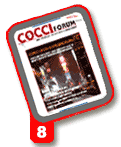SUMMER HELP
Goldkist veterinarian focuses on coccidiosis vaccination to give ionophores and other drugs a much needed rest.
It used to be that resting anticoccidials with rotation or shuttle programs was the only
way to improve their efficacy and performance in the field. But with resistance on the
increase and no new in-feed anticoccidials on the horizon, poultry companies are
beginning to rethink their long-term strategy for managing this disease.
For many operations, vaccinating "not medicating "for coccidiosis is not only
filling the void, but also breathing new life into in-feed products that were last seen
heading for the obituary column. While in Atlanta for the International Poultry
Congress, CocciForum flagged down key decision-makers at leading US poultry companies
for their thoughts on this issue. Following is the first in a series of post-convention
reports.
 Roney: 'Any time you're not
using a drug, you're resting it.'
|
Dr. Steve Roney, director of veterinary
services at Goldkist,
Inc., Atlanta, reports using coccidiosis
vaccine mostly in the summer
months and says it's a big help keeping
resistant strains down in the house.
"Vaccination during the summer
helps us lengthen the time that we can
use our ionophores and chemicals," he
explains. "In other words, we're placing
the vaccine in at a strategic time so that
we can get better control at other times
when we have heavier cocci challenge
from weather "times when we're
using ionophores and chemicals for
cocci control."
The main aim for Goldkist in implementing
use of the vaccine, says Roney,
was to regain the sensitivities of cocci
organisms to the ionophores and other
drugs they were using. And, he says,
that's pretty much the way things have
worked out.
"Over time, in our experimenting
with the vaccine and also talking with
other people who've used it, we think
that is the way it's going to be increasingly
used in the future "to use it in
rotation throughout the year, or one
time during the year, to break up the
resistant cycles from the coccidiosis,"
he says.
Backed by science
The strategy Roney's been employing at
Goldkist is backed by solid science. For
example, researchers at the University
of Arkansas recently wrapped up a
long-term study that compared how
several different rotation programs
affected strains of salinomycin-resistant
coccidia.
In one group, complete rest from
anticoccidials for four consecutive
flocks resulted in improved, but not
restored, sensitivity to salinomycin.
In another group that received three
different shuttles of Clinacox -
Clinacox/salinomycin, salinomycin/
Clinacox, or Clinacox/Clinacox "there
was nearly complete restoration of sensitivity
to salinomycin.
Interestingly, in still another group,
when Clinacox was used alone for four
consecutive flocks, the result was,
again, nearly complete restoration of
sensitivty to salinomycin.
Resting drugs
Roney feels this concept of "resting"
drugs is becoming increasingly integral
to the success of many modern poultry
operations.
"Any time you're not using a drug,
you're resting it," he reasons. "So you're
hoping that when you come back to
that drug you're going to get increased
efficacy."
The veterinarian thinks there's one
other plus to including a vaccine in the
program.
"With long withdrawal times on
conventional cocci programs, we get
the challenge of the oocysts pushed
farther in the bird's life, to the point
where we can't control it with chemicals
or with ionophores," he says.
"When that's the case, we can come in
with the cocci vaccine and it'll push the
challenge back earlier in the bird's life,
making it easier for our standard programs
to work when we go back to
them."
Roney is encouraged by results he's
seen so far with Coccivac.
"Based on what I've experienced in
the past couple of years, I think we're
on the right track. We're not all the way
there yet. But with the limited amount
of drugs that we have available, and
seeing no new products on the horizon,
I'm convinced that vaccination is
going to be a huge part of our program
in the future," he predicts.
Source: CocciForum Issue No.8, Schering-Plough Animal Health.







